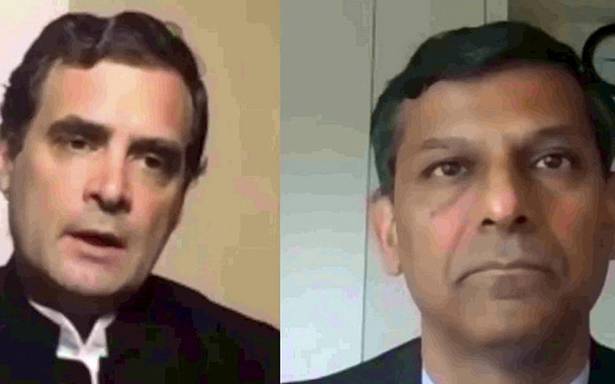Congress MP Rahul Gandhi’s publicised conversations with experts Raghuram Rajan last week and Abhijit Banerjee on Tuesday on the national response to COVID-19 pandemic are possibly part of efforts to remake himself ahead of his potential return as the party president. The conversations generated both praise and ridicule on predictable lines.
A more fundamental question has also been raised, whether a leader might undermine his own stature if he is seen as in need of advice from an expert. But these episodes were entirely in tune with Mr. Gandhi’s personality. Mr. Gandhi has said many times he does not possess any special attributes that makes him extraordinary. He has, in fact, warned against the idea of anyone making such claims.
Addressing captains of Indian industry in 2013, he said:
“One man riding a horse cannot solve the country’s problems, but it is a collective effort. The architecture we have to build is to connect the grassroots with the political system, open the political system. …People talk about individuals, large number of problems can be sorted out by the lower level people. Give a billion people the power to solve a problem, it”ll be solved in a jiffy.”
But the politics of India was already on a different course, and people were rallying around a man who promised to solve all their problems. In fact, not only India, around the world in several democracies such superman leaders occupy the centre stage now. These leaders claim omniscient wisdom on everything, offer instant solutions, and project an image of strong and decisive action. U.S. President Donald Trump has said he “knows better than anyone else” on topics as wide-ranging as construction, campaign finance, drones, technology, infrastructure, ISIS, H1B visa programme, environment, the power of Facebook, renewables, courts, steel workers, golf, banks, trade, nuclear weapons, tax laws and lawsuits. This catalogue is without even accounting for claims he made in relation to coronavirus, in recent weeks. Simultaneously, he has ridiculed experts, including in his own administration.
Consultative leadership
The notion of consultative leadership that Mr. Gandhi tries to project is not popular, unfortunately for him, for various reasons. For one, the protagonists of this model, generally free market social progressives, have a problem of legitimacy. The Congress Party and the Democratic Party of the U.S. are very similar in this regard. Carrying the accumulated baggage of corruption, nepotism and double standards of several decades, they are not seen trustworthy by large numbers. People see their parading of

